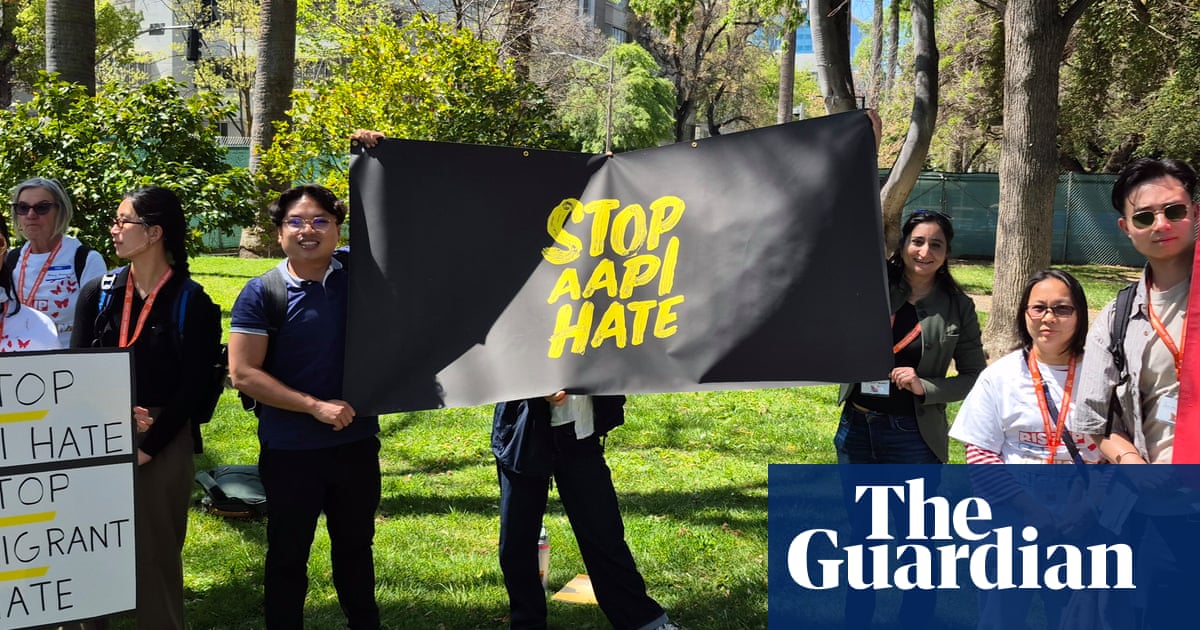Asian Americans and Pacific Islanders faced chilling levels of hate in 2024, a new survey has found, reflecting the impact of a divisive presidentialelectionyear that included historic representation and rampant anti-immigrant rhetoric.
The report byStop AAPI Hate,shared exclusively with the Guardian ahead of its release, shines a light on underreported incidents largely overlooked in government data and national news media. The coalition conducted its second annual survey with Norc at the University of Chicago, a nonpartisan research organization. Fifty-three percent of respondents said they experienced a race-based hate act in 2024, a small rise from 49% in 2023. Incidents ranged from bullying at school and workplace discrimination to harassment and physical violence.
Four out of every 10 people who faced a hate act said they did not tell anyone, including friends or family. Of those who experienced a potentially unlawful hate act, including explicit threats, physical harm or institutional discrimination, 66% did not report the incident to authorities, often due to the belief that the act wasn’t significant enough or that reporting wouldn’t make a difference.
Grace Meng, a New York Democrat who chairs the Congressional Asian Pacific American Caucus, said the coalition’s report helps fill a critical data gap, which she regarded as the largest barrier to government leaders taking action. Awareness of anti-Asian bigotry had increased since a wave of high profilehate crimesduring the Covid pandemic, Meng said, but since the general election, perpetrators seem empowered to openly express bigotry.
The coalition’s survey of nearly 1,600 Asian American and Pacific Islander adults took place from 7-15 January, days before Donald Trump’s inauguration. Over 80% of respondents expressed concern about the racial climate.
“Honestly, after this president was elected, many of us were nervous again,” Meng told the Guardian.
Just over four months into Trump’s second term, Meng is ringing the bell on a slew of anti-immigrant actions from Marco Rubio last week announcing he will carry outrevocations of Chinese students’ visas,to Trump’s attacks onbirthright citizenshipsince his first day in office, and widespread funding cuts for a host of institutions.
Meng said she expects the administration’s rhetoric and actions against immigrant communities to translate into more anti-Asian hate and violence this year.
In addition to the annual survey, Stop AAPI Hate manages areporting centerto gather data about incidents targeting Asian American and Pacific Islander communities. Stephanie Chan, director of data and research at Stop AAPI Hate, said perpetrators appear to have drawn inspiration from Trump’s comments on the campaign trail and echoed his sentiments across the US at schools, public transit stations, restaurants and more.
Some perpetrators have approached Asian Americans and said Trump would have them deported or arrested once he was back in office, according to the center. In one reported incident the day after the election, an Asian girl at school was handed a piece of paper scribbled green that read “green card” and “dog-eater”, an apparent reference to baseless slurs by Trump and other Republicans thatHaitian immigrantsin an Ohio city were eating pets.
At a big-box store in Washington state this year, a woman said someone called her a “Chinese peasant” – similar to comments made byVice-President JD Vance– and said she should go back to her country.
Chan also noted that the prominence of Kamala Harris and second lady Usha Vance in the political spotlight has placed a target on south Asian communities.
“South Asians are now in these prominent places of leadership in the business world and in the political world now, and there’s this sense that, ‘Oh, now they’re taking over,’” Chan said. “And so there has been that backlash to the rise in prominence and leadership in the country, in various sectors, by south Asian people.”
Stop AAPI Hate and other nonprofits recently filed a class-action lawsuit against the justice department over what they allege is anunlawful terminationof over$810min public safety grants previously awarded to hundreds of organizations.
The group, which was formed in 2020 amid a spike of pandemic-era bigotry, lost a $2m grant it had earmarked for violence prevention, survivor support and the reporting center’s data work.
A copy of the DoJ’s brief termination letter obtained by the Guardian says the grant “demonstrates that it no longer effectuates department priorities”. A justice department spokesperson declined to comment on the litigation.
”We have a very, very strong indication of what the Trump administration is trying to do,” said Cynthia Choi, co-founder of Stop AAPI Hate, which includes trying to stop any institution from getting in the way of his anti-immigrant agenda, including nonprofits, universities, law firms and the courts.
Choi noted some upsides from the 2024 survey, which found that 82% said they were optimistic about their community’s ability to combat racism – about the same percentage of people who expressed concern about the racial climate. Two-thirds of respondents said they participated in activities to reduce or resist racism, with Democrats, south-east Asians and those who had experienced hate more likely to get involved. Over 85% of respondents said they believed in the importance of cross-racial solidarity.
“We are organizing and really leaning into the fact that we have to fight back collectively, consistently and with determination, because the more that we allow Trump and the administration to roll back our rights, you know, there’ll be a point where there will be nothing that we can do about it,” Choi said. “That’s the part that is, I think, most frightening.”
“We know from history that overnight, democracies can become very fragile, and we know that overnight, once we lose our ability to speak out, to defend, to protect, we’ll have nothing left.”
